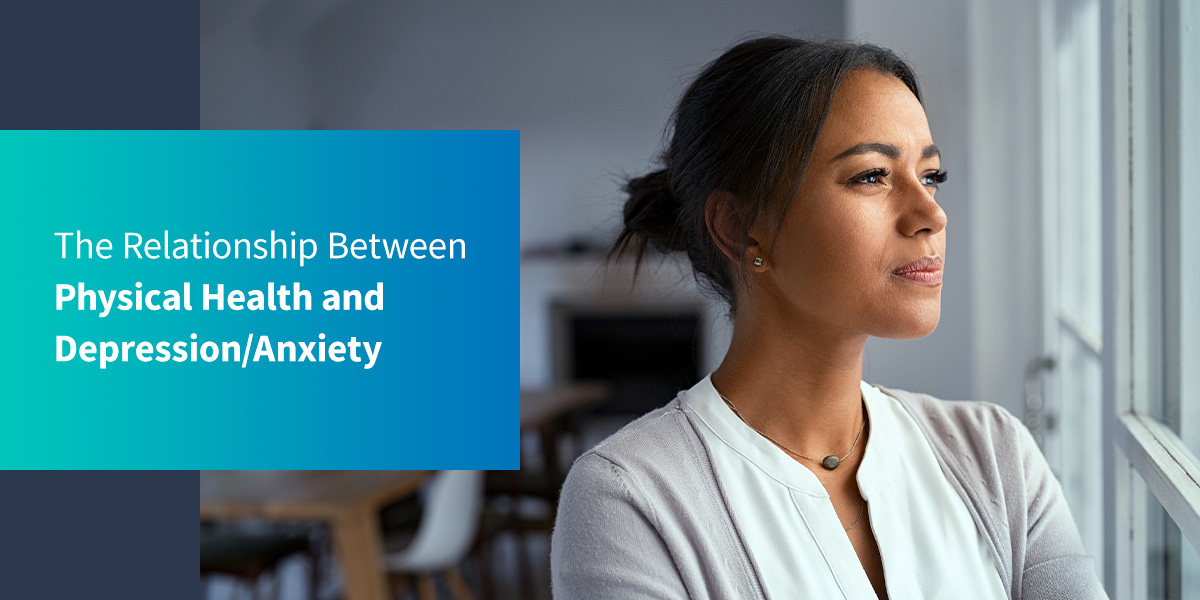
A diagnosis of a chronic illness or life-threatening physical ailment could cause depression or anxiety, but the reverse is also true. Unchecked anxiety or depression can contribute to the development of physical disease. Mental illnesses can even hinder one’s ability to heal or recover from a physical ailment.
More than 16% of people suffer from depression at some point in their lives, and over 40 million people are affected by anxiety disorders in the United States. These mental health disorders can vastly affect the body’s central nervous system, cardiovascular health and even the body’s immune response.
If you or a loved one is struggling with a physical or mental illness, it can be helpful to learn how the two affect one another. We’ll discuss the impact of depression and anxiety on physical health, treatment options and how transcranial magnetic stimulation (TMS) therapy can provide the help you need.
How Do Mental and Physical Health Interact?
What happens in a person’s mind can damage the body and vice versa. When a person’s mental illness goes untreated, it can increase their risk of becoming physically ill, while physical conditions can worsen symptoms of mental illness.
Several associations between mental health and physical conditions can impact a person’s quality of life. For instance:
- Poor mental health is a risk factor for chronic physical health conditions.
- Those with severe mental health conditions are at a high risk of developing a chronic physical illness.
- Those with chronic physical conditions are at risk of experiencing mental health issues.
Understanding the links between mind and body can help individuals develop methods of preventing these comorbidities. It can also help us support loved ones struggling with both mental illness and chronic physical health conditions.
How Depression Impacts the Body
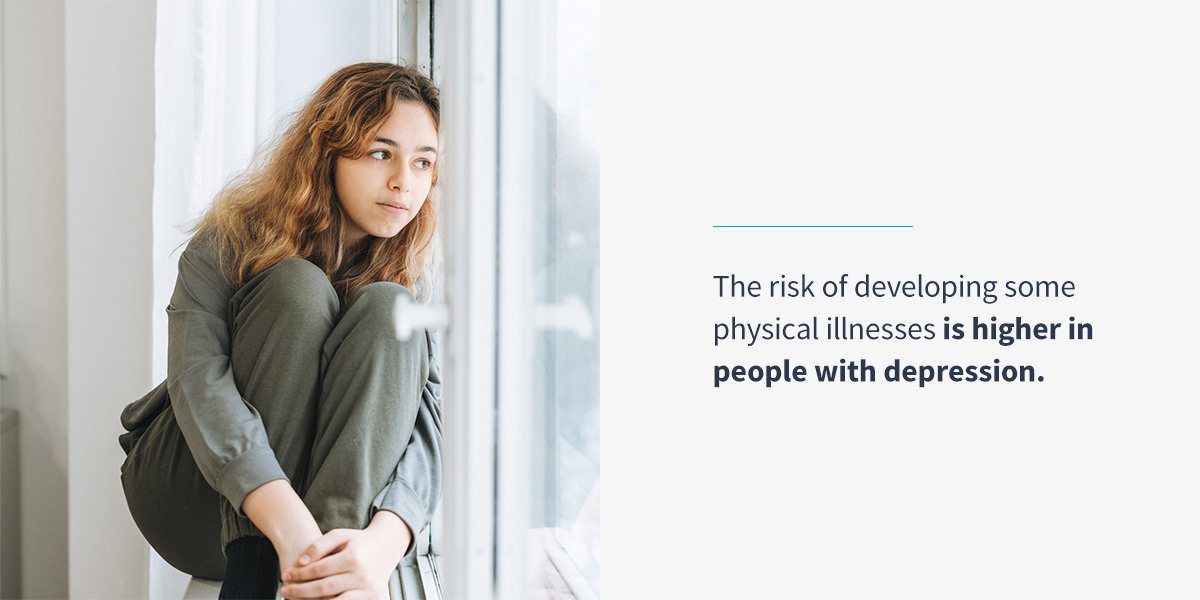
Depression can make you feel restless, empty and anxious. But most don’t realize how chronic depression can impact physical health and change the body.
Physical symptoms of depression can include weight loss or gain, aches and pains, headaches, digestive issues, cramps and insomnia or oversleeping. But that’s not all — the risk of developing some physical illnesses is higher in people with depression. For example, depression may increase your risk for cardiovascular disease, diabetes, stroke, osteoporosis and Alzheimer’s disease.
Depression might also change how the body functions. When we suffer from mental illness like depression, it can impact our physical health by causing:
- Increased inflammation
- Metabolic changes similar to those in individuals at risk of diabetes
- Changes in heart rate
- Changes in stress hormones
The National Institute of Mental Health (NIMH) says that if you struggle with depression and another physical illness, you may have more severe symptoms of both diseases.
Being diagnosed with a physical condition while depressed can also increase your risk of developing complications. Depression magnifies physical changes in the brain and body. If you already have heart issues, for example, higher amounts of stress hormones could make it harder for the body to repair tissue.
Depression could also make it more challenging to take medications and stick with a treatment regimen. And since pain is a potential symptom of depression, it makes sense that this would complicate treatment of those with chronic pain or worsen depression outcomes.
People with mental health issues are more likely to have preventable physical health conditions. This correlation may be because depression is tied to:
- Low motivation: Depression can affect your energy levels and motivation to take care of yourself.
- Difficulty concentrating: Depression can cause focus and concentration problems, which might make it more challenging to attend doctor’s appointments for physical issues.
- Being less likely to get medical help: Health care professionals might believe your physical symptoms are only part of your mental illness rather than an underlying health condition.
Depression can have various symptoms and cause physical health issues if unaddressed. It’s essential to recognize the link between depression in adults and physical health to prevent complications in yourself or your loved ones. While depression can feel like an uphill battle, it is treatable.
Let’s look at the various physical health conditions that can coexist with depression:
Cardiovascular System
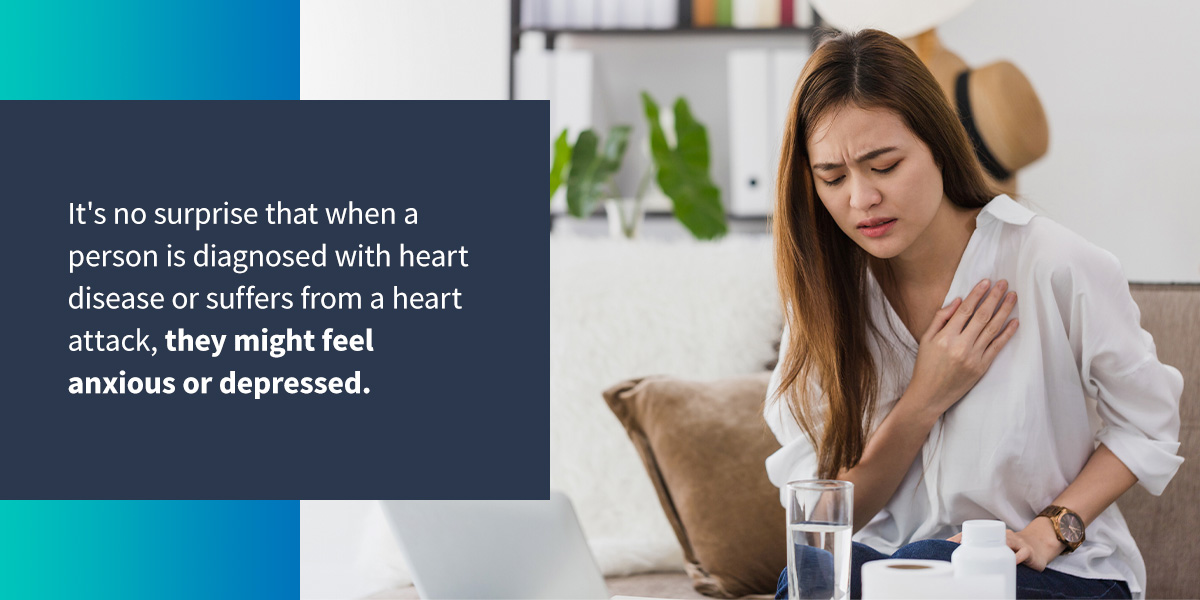
The toll depression takes on the body and the impact of depression on blood pressure and heart conditions are well-established in the medical world.
It’s no surprise that when a person is diagnosed with heart disease or suffers from a heart attack, they might feel anxious or depressed. But while these conditions might increase your risk of depression, depression itself might also increase the risk of developing heart disease.
With depression, your body produces more of the stress hormone cortisol. You may also experience increased heart rate and blood pressure, while blood flow to the heart decreases. Over time, these symptoms can lead to heart disease.
Depression has been identified as a new risk factor for coronary artery disease or a blockage in the heart vessels. Untreated depression can lead to a higher chance of dying after a heart attack, which is why many heart patients with depression are encouraged to keep their cardiologists informed on their mental health.
Immune System
Due to its ability to cause inflammation, depression and stress may weaken the immune system and leave you vulnerable to disease and infection. A weakened immune system might also contribute to autoimmune disorders like:
- Rheumatoid arthritis
- Gastrointestinal disorders like irritable bowel disease
- Multiple sclerosis
Digestive System
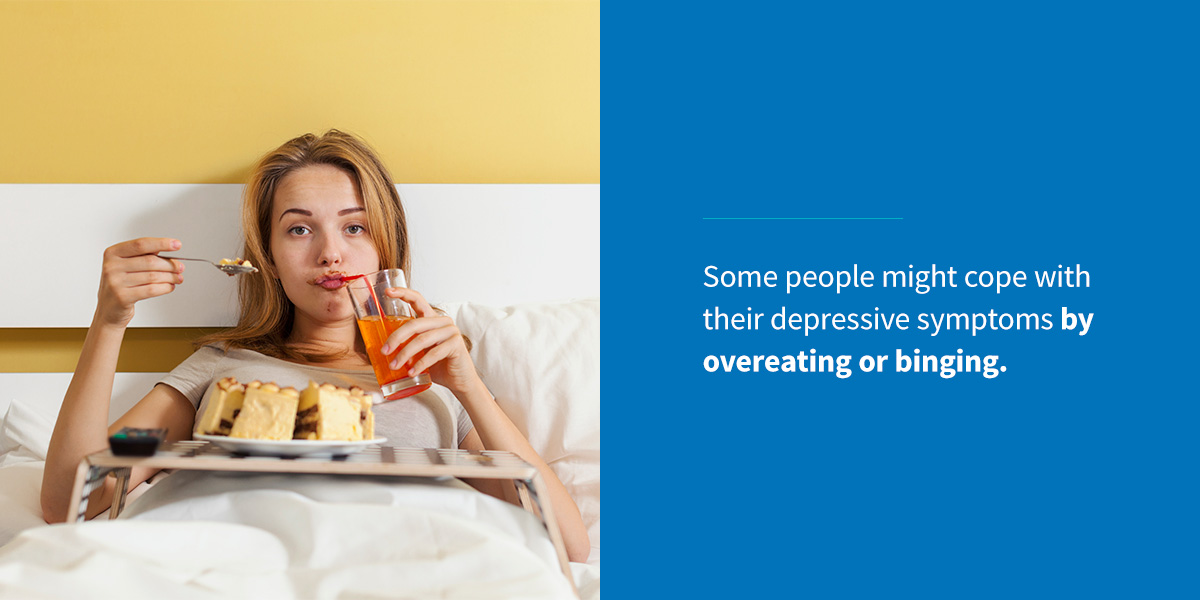
The impact of depression on physical health is far-reaching. While depression is thought of as a mental illness, it also plays a significant role in appetite and nutrition. Some people might cope with their depressive symptoms by overeating or binging, which can lead to weight gain or even diabetes. Certain psychiatric medications can also cause weight gain and difficulty managing blood sugar.
And while the link between diabetes and depression requires further research, studies have shown a connection between the two.
Since depression elevates levels of stress hormones such as cortisol, the resulting changes can introduce diabetes risk factors like:
- Problems with glucose or blood sugar metabolism
- Increased insulin resistance
- Accumulation of belly fat
In addition, those with depression often find it harder to exercise and eat healthily. Depression is also associated with sleep problems, impairing metabolism and increasing the risk of diabetes.
The Impact of Anxiety on Physical Health
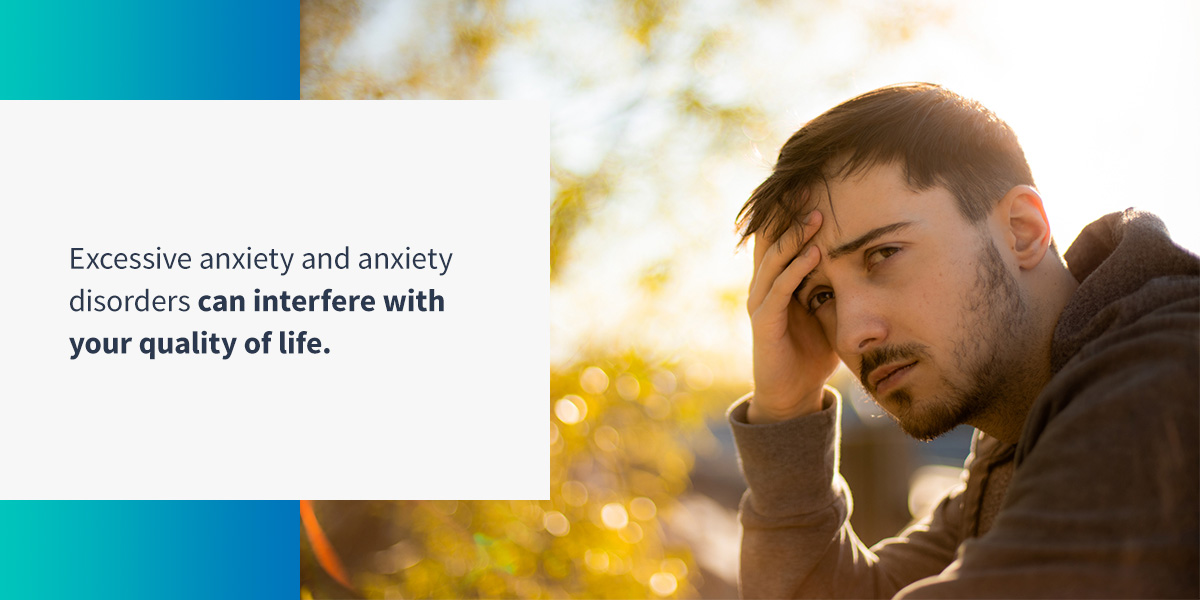
It’s also essential to address the subject of anxiety in adults and physical health. Nervousness affects everyone from time to time. It increases your heart rate and breathing, rushing blood to your brain in stressful situations, such as public speaking or job interviews.
Excessive anxiety and anxiety disorders can interfere with your quality of life. While it can result in behavioral changes, anxiety can also severely impact your physical health.
Types of anxiety disorders include:
- Social Anxiety Disorder
- Post-Traumatic Stress Disorder (PTSD)
- Obsessive-Compulsive Disorder (OCD)
- Panic Disorder
- Phobias or an intense fear of situations or objects
Each one of the above anxiety disorders can cause physical symptoms. Let’s look at the long-term physical impact of anxiety on various systems in the body:
Central Nervous System
Anxiety can cause many symptoms within the central nervous system that may be easy to dismiss or ignore. When you suffer from long-term anxiety and panic attacks, your brain will constantly release stress hormones. The release of these hormones can increase the frequency of headaches, depression and dizziness. Adrenaline and cortisol are two examples of stress hormones that flood your nervous system due to stress and anxiety.
While these chemicals might be helpful responses to intense situations, long-term exposure to adrenaline and cortisol can significantly harm your physical health and even increase your risk of a stroke.
Digestive System
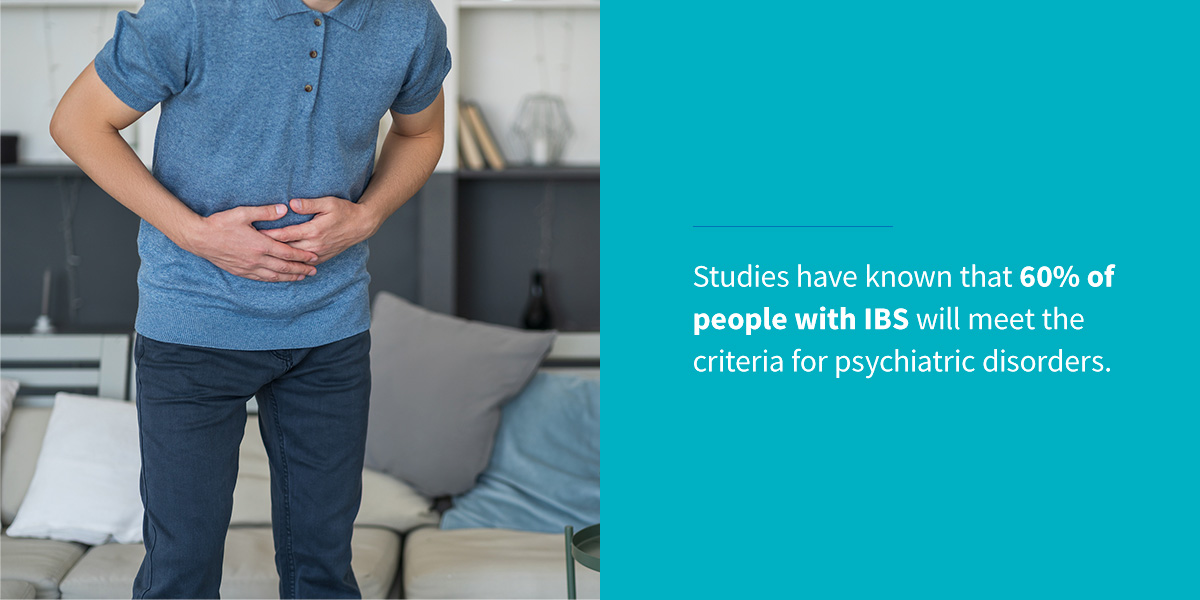
Our digestive and excretory systems are also affected by anxiety. That’s why it’s common to experience loss of appetite, nausea, diarrhea and stomachaches when suffering from bouts of anxiety or panic attacks.
There may also be a connection between anxiety disorders and the development of irritable bowel syndrome (IBS). Studies have known that 60% of people with IBS will meet the criteria for psychiatric disorders. Several theories might explain the connection between anxiety and digestive issues:
- Anxiety and stress trigger brain chemicals that might turn on pain signals in the gut and cause your colon to react.
- IBS might be triggered by the immune system, which is significantly impacted by stress and anxiety.
- Anxiety might make the mind more aware of colon spasms.
Immune System
Anxiety can trigger your fight-or-flight response by releasing chemicals and hormones, like adrenaline, into your system. Adrenaline increases your pulse and breathing rate to get more oxygen to your brain and prepare you for intense situations. It can also give your immune system a quick boost.
In the short term, your body will return to normal functioning after the stressful situation passes. However, persistent anxiety will keep your body in this panicked state. Over time, this can affect your immune system and leave you vulnerable to infections and illness.
Cardiovascular System
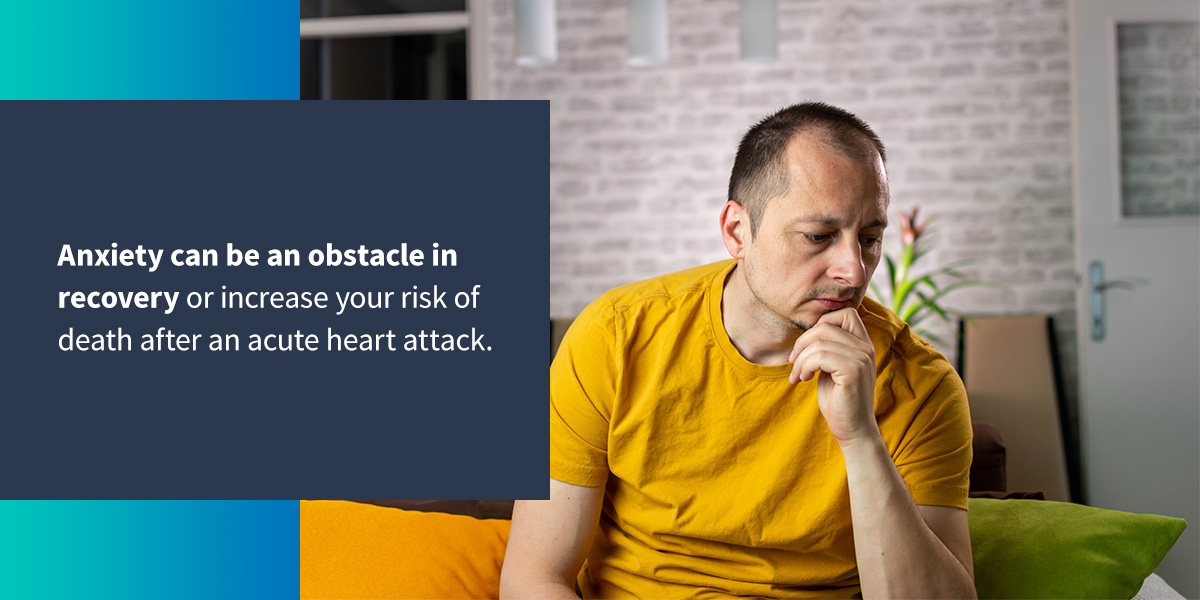
Since anxiety disorders are associated with frequent and rapid heart rate, palpitations and chest pain, they may increase your risk of high blood pressure or heart disease. Anxiety and high blood pressure can also increase your risk of coronary events, such as heart attacks.
Over time, your heart may weaken and leave you vulnerable to cardiac arrest. Anxiety can be an obstacle in recovery or increase your risk of death after an acute heart attack. That’s why it’s essential to speak to your cardiologist about existing mental health problems if you have cardiac disease.
Respiratory System
Anxiety causes shallow, rapid breathing, which can lead to complications if you suffer from respiratory diseases. For example, anxiety can increase your risk of hospitalization if you have chronic obstructive pulmonary disease (COPD), a disease that blocks airflow and results in breathing troubles. Excessive stress and anxiety can also make asthma symptoms worse.
How Physical Conditions Impact Mental Health
Now that we’ve discussed how depression and anxiety can cause physical symptoms and conditions, it’s essential to learn how physical conditions might lead to mental health concerns.
A combination of factors can contribute to depression and anxiety, such as genetics, biological factors and life circumstances.
It’s no surprise that people diagnosed with a chronic medical illness or condition, such as cancer, heart disease, chronic pain or any long-term medical condition, are more likely to struggle with depression and anxiety. In other situations, conditions like a stroke can change the brain and trigger symptoms of mental illness.
The following are some theories as to how physical conditions lead to depression or anxiety:
- Fluctuating hormone levels and neurotransmitters: Physical conditions are associated with abnormal levels of hormones and neurotransmitters that can impact mental health. Diseases like Parkinson’s, for instance, involve abnormal levels of dopamine, which is also a symptom of depression.
- Inflammation: Health conditions that cause inflammation, such as arthritis, might correlate to your risk of depression since depression is often associated with brain inflammation.
- Increased stress: Chronic illness can increase stress levels. The initial diagnosis can bring grief and shock. Anger about feeling misunderstood, for instance, can add to the body’s stress levels. A chronic illness diagnosis may bring with it schedule changes or medical expenses that also cause feelings of anxiety and depression.
- Brain changes: Chronic stress can cause the body to generate fewer neurons and more myelin-producing cells. This can affect the hippocampus — the part of the brain that regulates emotions, often associated with emotional disorders.
- Managing chronic symptoms: Physical health conditions can cause fatigue, frustration and stress when dealing with pain, treatments, tests or flare-ups.
Other features of chronic health issues, such as fear of death and the necessity to attend frequent health care appointments, might also contribute to depression and anxiety.

Studies have shown a higher suicide risk among those diagnosed with physical health problems, including diabetes, cancer and end-stage kidney disease. Other life-changing conditions like multiple sclerosis, stroke and brain injuries can lead to suicide. These findings suggest a strong need to treat depression among those with chronic physical health problems.
The following conditions experience a high comorbidity rate with anxiety and depression:
- Diabetes: The link between diabetes and mental health is well-established in the medical community. Studies show people with diabetes are up to three times more likely to experience depression than those without. Additionally, diabetes management is often associated with long-term stress since it involves controlling blood sugar levels and treating complications.
- Chronic pain: Long-standing pain that exists beyond recovery methods is referred to as chronic pain. As many as 85% of patients who suffer from chronic pain also experience severe depression. Chronic pain can cause inflammation and stress, as well as poor sleep and emotional distress.
- Stroke: Mental health problems can happen after a stroke. Up to 35% of people who suffer from a stroke will experience depression, while 25% might experience an anxiety disorder. Forgetfulness, carelessness, confusion and irritability are other common mental symptoms of a stroke.
- Heart disease: After a heart attack, it’s common for people to experience depression, anxiety disorders like PTSD, phobias and panic disorder resulting from shock.
How to Manage Depression and Anxiety
If you’ve determined that your physical symptoms might result from your depression or anxiety, there are several things you can do to find relief from symptoms.
A combination of therapy and certain medications, such as selective serotonin reuptake inhibitors (SSRIs), have been known to help people struggling with mental health disorders.
In cognitive behavioral therapy (CBT), therapists can help you determine how to manage anxiety and depression. To do this, you’ll learn to identify potential triggers of your mental illness. Then, you’ll work with your therapist to develop a plan to address symptoms and cope with stressors.
How to Improve Mental and Physical Health
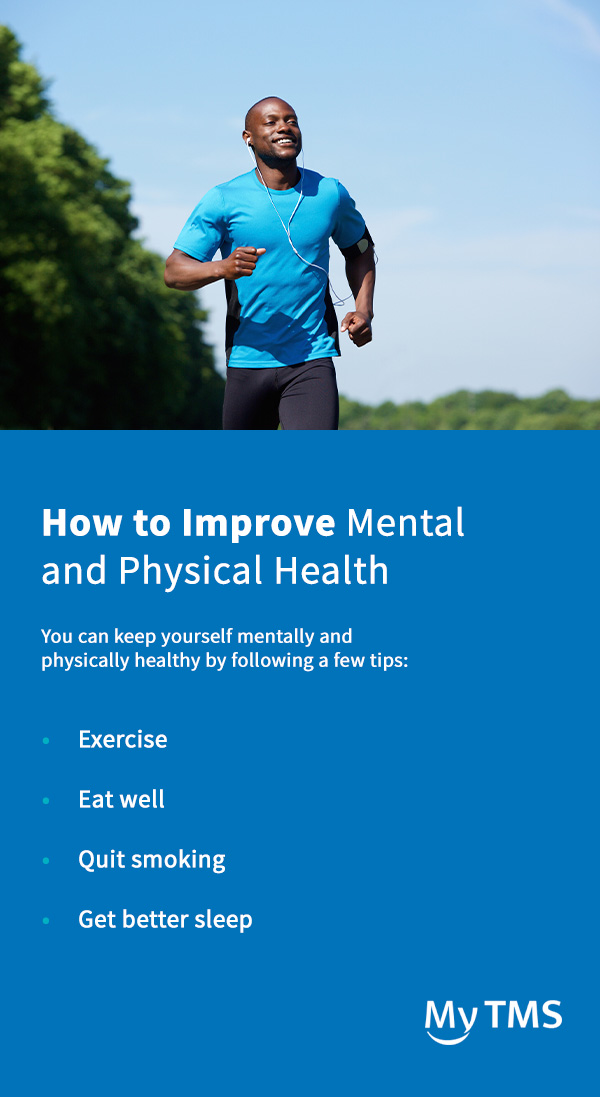
While the link between your mental and physical health might seem overwhelming to address, several treatment methods can alleviate symptoms and increase your quality of life.
It’s essential to keep your doctor informed about how you’re feeling both physically and emotionally. You can then learn how to receive help for mental health issues and strategies to cope with chronic illness. Your physician can determine steps to treat your chronic pain or other physical conditions, as well.
It’s also important to remember that experiencing mental illness doesn’t mean you’ll develop a physical health problem. Still, you can keep yourself mentally and physically healthy by following a few tips:
- Exercise: Physical activity can keep your body strong and improve mental well-being. Exercise causes your body to release endorphins, our body’s natural feel-good chemicals. Even just a short, brisk walk can help you feel more mentally alert and increase your mood. Activities and hobbies that involve physical movement, such as running, gardening or bicycling, can lower your stress and give you a sense of purpose.
- Eat well: Eating a nutritious diet can improve your mind and body. Our diets can influence the development and prevention of depression and anxiety. Maintaining a balanced diet of proteins, essential fats, vitamins, minerals and water is crucial, especially if you struggle with mental illness or a physical condition.
- Quit smoking: While those with mental illness might believe smoking can relieve symptoms, smoking negatively impacts your mental and physical health in the long run.
- Get better sleep: Sleep, mental health and physical health are closely connected. Sleep helps us maintain a healthy weight, improves focus and can even prevent depression and anxiety. You can improve your mental and physical health by getting the recommended seven to nine hours of sleep every night.
Get the Help You Need With My TMS Therapy
For decades, transcranial magnetic stimulation, or TMS, has been used as an effective treatment for depression and anxiety. TMS works by utilizing a magnetic field to regulate neural activity in the brain structures related to depression, specifically the dorsolateral prefrontal cortex (DLPFC). By enhancing activities in some regions of the brain, psychiatric professionals can alleviate mental illness symptoms and help improve your quality of life.
TMS has been approved by the Food and Drug Administration (FDA) to treat PTSD, OCD, depression, anxiety and other mental health conditions. Treatment is virtually pain-free and noninvasive.
Studies have shown that 50%-60% of patients with depression who couldn’t receive relief from medications experienced a clinically meaningful response from TMS. And about one-third of these individuals experienced full recovery from depression when they underwent TMS therapy.
At My TMS Therapy, you might receive treatment for depression and anxiety through the following methods:
- MagStim Repetitive TMS: This type of TMS therapy typically only requires five-minute sessions, five days a week for six weeks, to help treat mental illness. During your session, you’ll get to relax in a comfortable environment, read, listen to music or watch TV.
- BrainsWay Deep TMS: Similarly, BrainsWay is a safe and highly effective procedure that won’t cause long-lasting or adverse side effects. This deep session requires up to 20 minutes of your time to treat depression and anxiety.
Book an Appointment to Treat Your Depression and Anxiety Symptoms
As you now know, mental illness can affect our lives in significant ways and even worsen or contribute to physical health problems.
If you’re struggling with depression and anxiety and hoping to learn more about how TMS might help you, contact My TMS Therapy. Our board-certified clinicians and psychiatrists provide premier mental health services to help you overcome anxiety and depression and achieve a better outlook on life.
For anxiety or depression treatment, book an appointment today.


